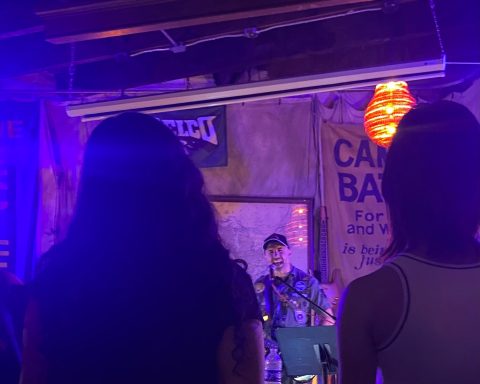Editor’s note: This article was initially published in The Daily Gazette, Swarthmore’s online, daily newspaper founded in Fall 1996. As of Fall 2018, the DG has merged with The Phoenix. See the about page to read more about the DG.
In the third installment of the series “Faith and Spirituality at Swarthmore,” Salman Safir ’16 shares his religious experiences at Swarthmore.
Raised Muslim by his mother, Safir has always viewed Islam as central to his beliefs, but from an early age faced criticism for his religion. “[It] was tough for me, but it made me a little more introspective about my beliefs,” Safir said. “It allowed me to […] think to other religions.” Ultimately, his questioning strengthened his faith. “Sometimes when you’re pushed to the brink, you come out stronger,” Safir said.
Safir continues to explore his interest in other faiths through his involvement with religious groups on campus. He is the president of BLISS, or Building Leaders in Islamic Support and Study. He also works as an intern for both the Interfaith Center and the Intercultural Center. As part of his work with the Interfaith Center, Safir meets with leaders of religious groups on campus to facilitate collaboration and community strengthening.
Safir enjoys his roles both in his own religious group and within the larger religious community at Swarthmore. “It gives you a lot of different perspectives […] you can also ground that within the general larger community,” Safir said. Safir hopes to raise awareness of that variety of experiences through interfaith work.
His experiences sharing his faith with the student body have been largely positive. “I think the whole student body is very, very open to all sorts of beliefs,” Safir said. Numerous students have approached Safir with questions about Islam, and he said is eager to talk with them.
However, Safir is concerned about the lack of administrative support regarding religious issues, both in facilitating discussions on faith and providing support for religious students. “We talk a lot about diversity at Swarthmore, but it seems like religion sometimes gets left out of that discussion. And I don’t think that’s the student body not wanting to discuss that,” he said.
“That’s problematic for people going out into a world that’s not aligned with the idea of community that we have at Swarthmore,” Safir continued. “It’s something that people are curious about and really want to learn about, but institutionally, it’s not there. […] It’s detrimental to the entire community because they’re missing something that they might really want to learn about,” he said.
Safir feels that the administration is not providing adequate support for religious students. One of his main goals is to raise awareness of the needs of religious students. “Being a Muslim at Swarthmore, you need Halal food in the kitchen, you need to be able to pray five times a day,” he said.
Safir mentioned Bond Hall’s placement on the outskirts of campus as a metaphor for the administration’s sidelining of religious life. He is also concerned that non-religious events held in Bond Hall often disrupt religious practices. “You’ll have groups upstairs practicing or in the midst of a spiritual moment, and then you’ll have all this noise from downstairs,” he said.
Lack of awareness of these issues among students is another issue that Safir is working on. “When I talk about [Interfaith Coordinator] Joyce [Tompkins] not being paid by the College, most people don’t know that,” Safir said.
He said believes that this lack of awareness has contributed to the relative silence regarding religion at Swarthmore, even amidst widespread discussion on the administration last spring. Safir believes discussions are moving in the right direction as people become more aware of these issues. “They are starting to come to light,” Safir said.
Safir is glad for the discussions at Swarthmore on social justice issues, but he wishes that the school would facilitate discussion on the intersection between religion and these other issues. “Right now there just aren’t the resources there to explore that, to end misconceptions, to end the idea that you can’t be Muslim and part of the LGBT community, or you can’t be Muslim and support women’s rights,” he said.
In his own life, Safir has worked to deal with points of friction between his religion and social justice issues. He feels that Swarthmore should work to create areas of discussion on intersectionality. “A lot of these conversations just don’t happen,” Safir said.
Through his work, Safir hopes to encourage awareness of the issues faced by religious students and foster discussion. With more discussion, there may be more dialogue on religion’s relationship to other social justice issues. “I love how Swarthmore has made me a better person,” Safir said. “I just wish I could incorporate that with a lot of other things in my life. To be a little bit more complete.”












